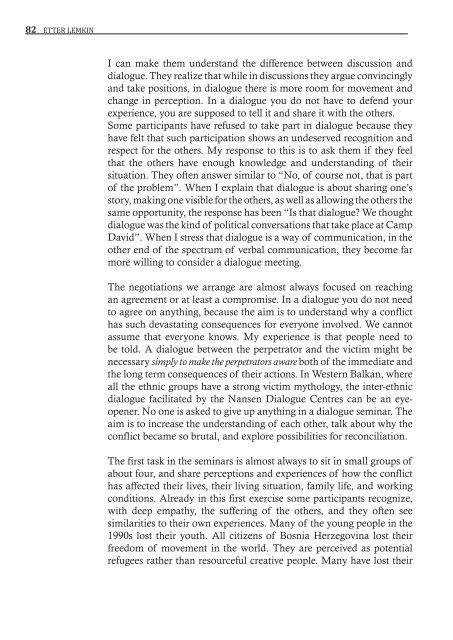Utgave - Etter Lemkin
Utgave - Etter Lemkin
Utgave - Etter Lemkin
Create successful ePaper yourself
Turn your PDF publications into a flip-book with our unique Google optimized e-Paper software.
82 ETTER LEMKIN<br />
I can make them understand the difference between discussion and<br />
dialogue. They realize that while in discussions they argue convincingly<br />
and take positions, in dialogue there is more room for movement and<br />
change in perception. In a dialogue you do not have to defend your<br />
experience, you are supposed to tell it and share it with the others.<br />
Some participants have refused to take part in dialogue because they<br />
have felt that such participation shows an undeserved recognition and<br />
respect for the others. My response to this is to ask them if they feel<br />
that the others have enough knowledge and understanding of their<br />
situation. They often answer similar to “No, of course not, that is part<br />
of the problem”. When I explain that dialogue is about sharing one’s<br />
story, making one visible for the others, as well as allowing the others the<br />
same opportunity, the response has been “Is that dialogue? We thought<br />
dialogue was the kind of political conversations that take place at Camp<br />
David”. When I stress that dialogue is a way of communication, in the<br />
other end of the spectrum of verbal communication, they become far<br />
more willing to consider a dialogue meeting.<br />
The negotiations we arrange are almost always focused on reaching<br />
an agreement or at least a compromise. In a dialogue you do not need<br />
to agree on anything, because the aim is to understand why a conflict<br />
has such devastating consequences for everyone involved. We cannot<br />
assume that everyone knows. My experience is that people need to<br />
be told. A dialogue between the perpetrator and the victim might be<br />
necessary simply to make the perpetrators aware both of the immediate and<br />
the long term consequences of their actions. In Western Balkan, where<br />
all the ethnic groups have a strong victim mythology, the inter-ethnic<br />
dialogue facilitated by the Nansen Dialogue Centres can be an eyeopener.<br />
No one is asked to give up anything in a dialogue seminar. The<br />
aim is to increase the understanding of each other, talk about why the<br />
conflict became so brutal, and explore possibilities for reconciliation.<br />
The first task in the seminars is almost always to sit in small groups of<br />
about four, and share perceptions and experiences of how the conflict<br />
has affected their lives, their living situation, family life, and working<br />
conditions. Already in this first exercise some participants recognize,<br />
with deep empathy, the suffering of the others, and they often see<br />
similarities to their own experiences. Many of the young people in the<br />
1990s lost their youth. All citizens of Bosnia Herzegovina lost their<br />
freedom of movement in the world. They are perceived as potential<br />
refugees rather than resourceful creative people. Many have lost their


